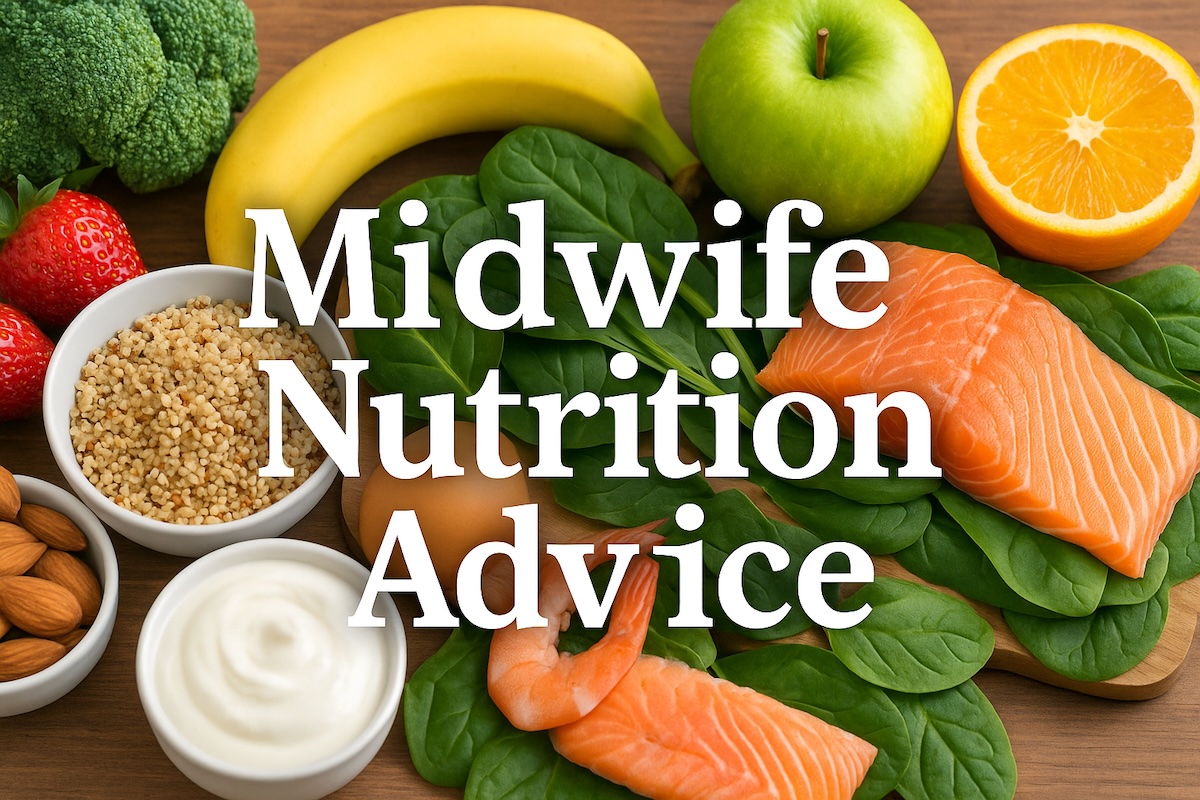“When you nourish yourself, you nourish the life growing inside you.”
Midwives understand this intimately. They bring a holistic, woman-centered approach to pregnancy nutrition, combining science with compassion. This guide shares essential midwife nutrition advice, practical tips that support a healthy pregnancy, and empower you to make confident choices at the table and beyond.
Midwife Nutrition Advice
A midwife’s role goes beyond catching babies. It’s about cultivating wellness. And that begins with what’s on your plate.
Why Nutrition Matters in Pregnancy
- Reduce the risk of complications (like gestational diabetes or preeclampsia)
- Improve energy levels and sleep
- Support mental well-being
- Build a strong placenta and healthy blood supply
Whole Foods as the Foundation
Focus on:
- Fresh vegetables and fruits
- Pasture-raised meats and eggs
- Wild-caught fish
- Whole grains (quinoa, brown rice, oats)
- Nuts, seeds, and legumes
Common Pregnancy Complaints Eased by Nutrition
- Morning sickness: Eat small, protein-rich snacks throughout the day.
- Fatigue: Stabilize blood sugar with regular meals and limit refined carbs.
- Constipation: Add chia seeds and leafy greens, and stay hydrated.
- Heartburn: Avoid spicy or acidic foods and eat slowly.
How Midwives Personalize Nutrition Guidance
Midwives consider:
- Cultural and religious dietary preferences
- Allergies and food sensitivities
- Ethical food choices (like veganism)
- Financial accessibility and food availability
Essential Nutrients for a Healthy Pregnancy
| Nutrient | Role | Food Sources |
|---|---|---|
| Folate | Prevents neural tube defects | Lentils, leafy greens, liver |
| Iron | Supports blood volume | Red meat, spinach, and molasses |
| Calcium | Builds bones and teeth | Broccoli, sardines, yogurt |
| Omega-3s | Brain and eye development | Salmon, flaxseeds, walnuts |
| Choline | Nervous system support | Eggs, liver, quinoa |
Midwife-Approved Supplements and Herbs
- Whole-food prenatal vitamins
- Vitamin D3
- Magnesium
Herbal teas:
- Red raspberry leaf
- Nettle
- Alfalfa
Hydration and Fluid Intake
- Drink half your body weight in ounces of water per day
- Try lemon water or herbal teas
- Watch for signs of dehydration
Sample Daily Meal Plan
Breakfast: Oatmeal with chia, almond butter, banana
Snack: Boiled egg + apple
Lunch: Quinoa bowl with veggies, chickpeas
Snack: Hummus with carrots
Dinner: Salmon, greens, sweet potatoes
Evening: Warm milk with nutmeg
Staying Nourished When You’re Busy
- Batch cooking
- Snack prepping
- Freezing meals ahead
Nutrition in the 4th Trimester
- Soups, stews, and broths
- Iron-rich meals
- Continue prenatal vitamins and hydration
Nutrition Support in Midwifery Care
- Nutritional therapy
- Food logs
- Tailored supplement advice
Activity and Movement to Complement Nutrition
Movement suggestions: walking, yoga, swimming, dancing
Supportive Therapies Recommended by Midwives
- Chiropractic
- Acupuncture
- Massage therapy
Conclusion
Food is more than fuel; it’s foundational. When guided by a midwife, nutrition becomes a personalized, nurturing act that supports your body and your baby.
Looking for more midwifery resources? Explore our careers guide or learn about the difference between midwives and OBs.
Frequently Asked Questions
Can I follow a vegetarian or vegan diet while pregnant?
Yes, but careful planning is needed. Focus on getting protein, B12, iron, and omega-3s.
What if I can’t keep food down?
Snack often, eat protein, and try ginger. Some midwives recommend vitamin B6 or magnesium.
Do I need a prenatal vitamin if I eat well?
Yes. A healthy diet may not provide enough folate, iron, and vitamin D.
Are there foods I should avoid during pregnancy?
Avoid raw or undercooked meats, unpasteurized dairy, and fish high in mercury.
Can midwives help manage gestational diabetes?
Yes. Many midwives offer meal planning and support before using medication.








